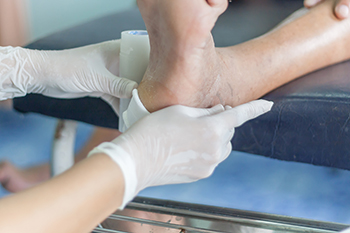
Some diabetic patients suffer from foot ulcers, and research shows that about 40% of these ulcers become infected. The risk of foot infections becomes higher when someone with diabetes has other foot conditions, like bunions or hammertoe, that involve high compression areas of the foot. Signs of foot infections include tenderness, warmth, and drainage. Podiatrists can take cultures of these ulcers to help guide treatment options, usually involving antibiotics. Severe infections can lead to more serious conditions, such as cellulitis and necrotizing fasciitis, and may require surgery. Many diabetics develop peripheral neuropathy, causing a loss of sensation in their feet and making them unaware of problems brewing on their feet. Due to the potential seriousness of diabetic foot infections, it is strongly suggested that diabetic patients are under the care of a podiatrist to get regular foot examinations. If a foot wound develops, see a podiatrist immediately.
Wound care is an important part in dealing with diabetes. If you have diabetes and a foot wound or would like more information about wound care for diabetics, consult with Neeta Hasmukh, DPM from Total Podiatry. Our doctor will assess your condition and provide you with quality foot and ankle treatment.
What Is Wound Care?
Wound care is the practice of taking proper care of a wound. This can range from the smallest to the largest of wounds. While everyone can benefit from proper wound care, it is much more important for diabetics. Diabetics often suffer from poor blood circulation which causes wounds to heal much slower than they would in a non-diabetic.
What Is the Importance of Wound Care?
While it may not seem apparent with small ulcers on the foot, for diabetics, any size ulcer can become infected. Diabetics often also suffer from neuropathy, or nerve loss. This means they might not even feel when they have an ulcer on their foot. If the wound becomes severely infected, amputation may be necessary. Therefore, it is of the upmost importance to properly care for any and all foot wounds.
How to Care for Wounds
The best way to care for foot wounds is to prevent them. For diabetics, this means daily inspections of the feet for any signs of abnormalities or ulcers. It is also recommended to see a podiatrist several times a year for a foot inspection. If you do have an ulcer, run the wound under water to clear dirt from the wound; then apply antibiotic ointment to the wound and cover with a bandage. Bandages should be changed daily and keeping pressure off the wound is smart. It is advised to see a podiatrist, who can keep an eye on it.
If you have any questions, please feel free to contact our offices located in San Antonio, Uvalde, and Jourdanton, TX . We offer the newest diagnostic and treatment technologies for all your foot care needs.
